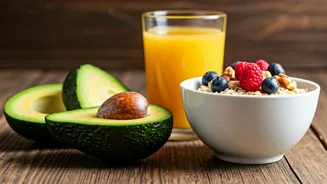Oats: A Daily Start
Oats are a champion in the fight against high cholesterol, and that's why they are a great place to start. This breakfast staple is rich in soluble fiber,
which acts like a sponge to soak up LDL (bad) cholesterol in your digestive system. It then carries it out of your body, keeping your arteries clear. Eating just 1.5 cups of cooked oatmeal daily can lower total cholesterol by 5% to 8%. Adding fruits like berries or a handful of nuts can boost the cholesterol-lowering effects. This makes oats a simple, delicious, and effective way to support heart health. Consider swapping out sugary cereals for a bowl of oatmeal to get the maximum benefit and give your heart a boost!
Beans: Fiber Powerhouse
Beans, also packed with soluble fiber, are a fantastic addition to your diet. Varieties like kidney beans, black beans, and lentils contribute to lower cholesterol levels. The fiber in beans binds to cholesterol in the gut, preventing its absorption into the bloodstream. They also offer a low-fat, high-protein alternative to meat, reducing the intake of saturated fats often found in animal products. Incorporating beans into your meals is easy; add them to soups, salads, or stews. Eating just half a cup of cooked beans each day can make a noticeable difference. Beans are a versatile and cost-effective way to improve your heart health and promote a balanced diet.
Nuts: Heart-Healthy Snack
Nuts, especially almonds, walnuts, and pecans, are a delicious way to lower cholesterol. Rich in unsaturated fatty acids, nuts help reduce LDL cholesterol while providing essential nutrients like magnesium, potassium, and fiber. Eating a small handful of nuts daily can be beneficial. However, it's important to remember that nuts are calorie-dense, so portion control is key. Aim for about 1.5 ounces daily to reap the heart-healthy rewards without adding excess weight. Choose raw or dry-roasted nuts over those with added salt or sugar. Nuts are a convenient and satisfying snack that actively supports heart health, making them an excellent addition to a heart-conscious lifestyle.
Fatty Fish: Omega-3 Boost
Fatty fish like salmon, mackerel, and tuna are excellent sources of omega-3 fatty acids, which can boost heart health. These healthy fats help lower triglycerides, a type of fat in the blood, and can slightly reduce LDL cholesterol. Omega-3s also help raise HDL (good) cholesterol. Aim to eat fish at least twice a week. Consider grilling, baking, or poaching fish to maintain its nutritional value without added fats. Including fish in your diet not only benefits your heart but also provides essential nutrients and supports overall well-being. This makes fatty fish a delicious and important part of a heart-healthy diet.
Fruits: Apple Power
Apples, along with other fruits like grapes, strawberries, and citrus fruits, can help lower cholesterol. These fruits contain pectin, a type of soluble fiber that binds to cholesterol in the digestive system, preventing its absorption. Apples also contain antioxidants that combat inflammation and protect against heart disease. Eating one or two apples a day can contribute to improved cholesterol levels. It's advisable to eat the whole fruit rather than drinking juice, to get the full fiber and nutritional benefits. Incorporating a variety of fruits into your daily diet is a tasty and effective way to support heart health and maintain overall wellness.
Vegetable Oils: Smart Choice
Switching from saturated fats, such as those found in butter and animal products, to unsaturated fats, like olive oil, can greatly affect your cholesterol levels. Olive oil, in particular, is rich in monounsaturated fats, which help lower LDL cholesterol. Using olive oil for cooking and in salad dressings is a simple way to incorporate this heart-healthy choice into your diet. Other vegetable oils, such as sunflower and canola oil, also offer benefits. When choosing oils, opt for those that are cold-pressed or extra virgin to ensure minimal processing and maximum nutritional value. These choices are simple steps to promoting heart health and can significantly impact your overall well-being.
Plant Stanols/Sterols
Plant stanols and sterols, which are compounds found in plants, can significantly lower cholesterol levels. They are added to foods like yogurt, orange juice, and spreads. They work by blocking the absorption of cholesterol in the small intestine. Consuming foods fortified with stanols and sterols can lower LDL cholesterol by up to 10%. While these foods can be beneficial, they are best used in conjunction with other lifestyle changes, such as a healthy diet and exercise. Always read food labels and follow the recommended serving sizes. Incorporating plant stanols and sterols into your diet, alongside the other recommendations, is a proactive way to manage cholesterol and reduce the risk of heart disease.














